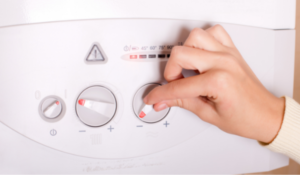
What is the grant for?
The heat pump grant - also called the Boiler Upgrade Scheme - is part of the government's £3.9bn plan to reduce carbon emissions from heating, which accounts for more than 20% of the UK’s total carbon footprint, in order to meet its commitment to reduce greenhouse gas emissions to net zero by 2050.
By 2025, a ban on fitting conventional gas boilers in new-build homes will come into effect, and it is hoped that the sale of new boilers to all households will be phased out by 2035. Many are worried, however, that the cost of implementing green technology will fall mostly to the consumer.
Heat pumps - the main alternative to gas boilers - are notoriously expensive to install. A Censuswide survey for the RSK Group found that the cost of installing an air source heat pump can cost between £7,000 and £14,000, while ground source heat pumps can cost as much as £35,000.
The new grant is designed to subsidise these upfront costs so that UK households can gradually move away from fossil fuel boilers in a way that is “affordable, practical and fair".
When will the grant be available?
The heat pump grant will be available from April 2022, although an exact date has yet to be confirmed.
How do you apply for the grant?
Details on how to apply for the Boiler Upgrade Scheme have not yet been released.
Will your heating bill go up if you have a heat pump installed?
Most heat pumps are powered by electricity. According to the Energy Savings Trust, although electricity is considerably more expensive than fossil fuels such as gas or oil, heat pumps are 3 to 4 times more efficient than traditional boilers. This means that the average running cost of an electrical heat pump is actually similar to a standard gas boiler.
In fact, the Energy Savings Trust found that an air source heat pump installed in a 4-bedroom detached house could work out between £395 and £425 per year cheaper to run than an old G-rated gas boiler, £500 cheaper than a G-rated oil boiler, and as much as £1,300 cheaper than a G-rated liquid petroleum gas boiler. However, G-rated boilers have the lowest energy efficiency rating and are usually more than 15 years old, so the savings for replacing a more modern boiler system with a heat pump are likely to be smaller.
So, if you can afford to shoulder the initial installation cost, you should find that an electrical heat pump costs around the same to run as a gas boiler - and potentially even less - particularly if you are replacing an old heating system that has a low-efficiency rating.
Pros and cons of air source heat pumps
Based on a typical air source heat pump.
| Pros | Cons |
Cheapest air source heat pumps
Prices are estimates and do not include the cost of installation.
| Manufacturer | Model | Energy Efficiency Rating | Purchase Price |
| Samsung | EHS Mono | A++ | £1,750 – £4,000 |
| Vaillant | aroTHERM | A++ | £3,000 – £7,000 |
| Hitachi | Yutaki S802 | A+++ | £4,000 – £6,000 |
| LG | THERMA V R32 | A+++ | £4,000 – £6,000 |
| Mitsubishi | Ecodan QUHZ | A++ | £4,000 – £6,000 |
| Grant | Aerona³ | A+++ | £4,000 – £7,000 |
| Daikin | Altherma 3 | A++ | £6,000 – £8,000 |
| Nibe | F2040 | A+++ | £6,000 – £8,500 |
(Source: boilerguide.co.uk, prices correct as of 19/10/21)


